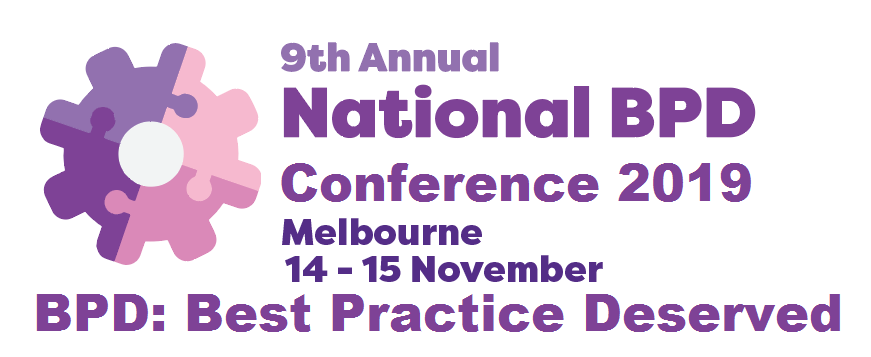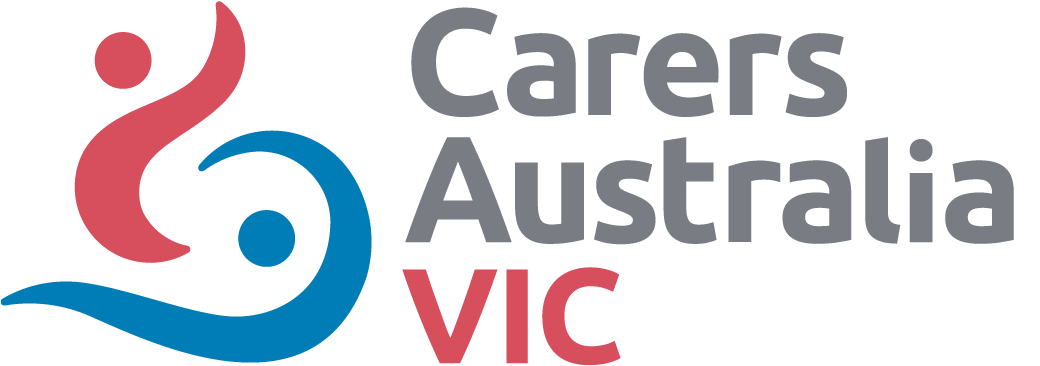
Advocacy & Support for
Borderline Personality Disorder
& Complex Trauma
2019 'BPD: Best Practice Deserved' Conference
9th ANNUAL NATIONAL BORDERLINE PERSONALITY DISORDER CONFERENCE in Melbourne
Ministerial Address Hon Martin Foley MP (Minister for Mental Health (Vic), Minister for Equality, Minister for Creative Industries)
Welcome Message Minister Greg Hunt (Federal Minister for Health)
President’s Address Rita Brown
Keynote Presenter: "Borderline Personality Disorder - Controversies, Challenges and Collaborations" Professor Jayashri Kulkarni.
Lived Experience Plenary "Embracing BPD' - Carissa Wright
Lived Experience Plenary Mahlie Jewell and Kyla Cassells
Workshop: Update on Current Research Facilitated by Jillian Broadbear
- Julian Nolan - Is there any relationship between BPD and Sexual Diversity Status?
- Fiona Donald (Spectrum) – consumer perspectives on personal recovery
- Elise Carrotte Exploring the Experiences of Healthcare Professionals Regarding Borderline Personality Disorder
- Emily Molyneux - Romantic Relationships and BPD
Workshop: Supporting eligible people to get into the NDIS (and making it work once they’re in). Facilitated by Lynne Doherty.
- Neil Turton-Lane (VMIAC)
- Tania Nicholls (St Vincent’s Mental Health)
- Tania Curlis (Tandem)
Panel: Development of a National Policy Panel. Facilitated by Dr Peggy Brown AO
- A/Prof Sathya Rao,
- De Backman-Hoyle,
- Mahlie Jewell,
- Rita Brown
Sponsors
_ _ _
Welcome to Country: Ron Jones
Ministerial Address: The Hon Martin Foley MP (Minister for Mental Health (Vic), Minister for Equality, Minister for Creative Industries) issues an invitation for us to all work together to ensure that the once in a lifetime opportunity for change and reform within then mental health sector is taken up.
Welcome Message: Minister Greg Hunt (Federal Minister for Health)
"Thank you for the opportunity to convey my support for your important and timely conference.
As you know, the Australian Government is funding an unprecedented range of reforms and initiatives to improve mental health care for Australians. It is our number one social policy issue and a major focus of Australia’s first ever Long Term National Health Plan.
Our aim is to build a mentally healthier nation through a new mental health system that is single, unified and integrated.
Mental illness is everyone’s business. We are all touched by it in some way. Borderline Personality Disorder is a mental illness that can have a profound impact, not only on people living the experience, but also on their family, friends and colleagues.
It affects up to four per cent of the Australian population and tragically, up to 10 per cent of people with BPD will die by suicide.
Since 2014, the first week of October each year has been recognised as Borderline Personality Disorder Awareness Week, highlighting the significant psychological, physical and emotional impacts of the condition, with the aim of promoting awareness and understanding of this complex illness.
Improved awareness of Borderline Personality Disorder is being progressed through webinars conducted by the Mental Health Professionals Network, the most recent being Collaborative Care and Borderline Personality Disorder, posted on 12 July 2019. This training supports the development of health professionals to be more familiar with providing mental health treatment and care to patients with Borderline Personality Disorder. Further information and links are available at: https://www.mhpn.org.au/news
Improving Australia’s mental health system and outcomes for people with mental illness, including Borderline Personality Disorder, requires a collaborative effort. The Australian Government is committed to continued consultation and engagement in order to achieve better mental health for all Australians."
President's Address: Rita Brown (President) gives an outline of the vision of the foundation and the work they are undertaking
Keynote Presenter: Borderline Personality Disorder - Controversies, Challenges and Collaborations - Professor Jayashri Kulkarni.
BPD is described as a highly prevalent condition that is unfortunately associated with considerable stigma. Controversies abound about the role of trauma in the development of the condition and parallels can be drawn with 'shell shock' or post traumatic stress disorder (PTSD). A new category of 'complex PTSD has appeared in the International Classification of Disorders 11 by the World Health Organisation, with a number of symptoms that overlap with the symptoms of BPD. So - is it BPD or cPTSD?
Regardless of the name of the condition - people with the condition often struggle to receive appropriate care and misunderstanding about the cause and treatment of this illness are common. Overall, from both clinical and research perspectives, it is obvious that a holistic, personalised approach for each individual is required to optimise outcomes.
In this talk, the latest hypotheses about the role of trauma creating and perpetuating the condition as well as important new discoveries from neurobiology will be discussed. Most importantly, potential new treatment approaches will also be discussed."
Jayashri KULKARNI commenced her appointment as Professor of Psychiatry, The Alfred and Monash University in 2002. She directs a large psychiatric research group, the Monash Alfred Psychiatry Research Centre (MAPrc), a large multisite clinical research centre with an extensive collaborative network nationally and internationally. The Centre is dedicated to discovering new treatments, new understanding and new services for people with a range of mental illnesses.
Jayashri Kulkarni completed her primary medical degree at Monash University and worked mainly in Emergency Medicine before deciding to specialise in Psychiatry. She became a Fellow of the Royal Australian and New Zealand College of Psychiatrists in 1989 and was awarded a PhD from Monash University in 1997 for her thesis “Women and Psychosis”. Jayashri has pioneered the novel use of estrogen as a treatment for schizophrenia and is internationally acknowledged as a leader in the field of reproductive hormones and their impact on mental health. An expert in Women’s Mental Health, Jayashri was elected the President of the International Association of Women’s Mental Health, a role she held from 2017 -2019. She sits on many advisory boards for Government, the NHMRC, Industry and Universities. Jayashri is a popular speaker with numerous media engagements.
Professor Kulkarni was recognised for her contribution to Medicine, particularly Psychiatry, by being made a Member of the Order of Australia (AM) in June 2019. This presentation was sponsored by Epworth Hospital
Lived Experience Plenary: Embracing BPD - Carissa Wright
Carissa is a full time peer support worker and facilitator of her own peer support group 'Embracing Borderline Personality Disorder'. In this presentation she will articulate the obstacles and the navigation to get to the destination of facilitating her own support group, as well as break down how peer support and sharing of lived experience was instrumental in her own road to recovery.
Bio: Carissa Wright is a peer support worker and facilitator hailing from Perth, Western Australia. Carissa has advocated on national and international levels, fighting against stigma and striving to make sure BPD is treated with respect and understanding within the mental health system. She facilitates her very own peer support group which was founded in September 2018. She also has contributed to The Mighty, and is a lived experience speaker for a handful of organisations in WA.
Lived Experience Plenary: Beyond Bloodlines: Navigating the Public Mental Health System as chosen family - Mahlie Jewell and Kyla Cassells
Mahlie Jewell’s advocacy on the experiences of living with BPD, PTSD and brain injury have been published nationally. She has lead roles in consumer consultation with The Australian BPD Foundation, Project Air Strategy, Department of Education and The NSW Mental Health Commission. She is currently completing a Masters of Art Therapy at University of Western Sydney.
Kyla Cassells is a supporter advocate who has navigated the NSW public mental health system with Mahlie for over 10 years as chosen next of kin.
Q&A: Mahlie and Kyla will speak about their 20 year friendship and the impacts, challenges and triumphs of kinship whilst managing Mahlie’s complex mental health challenges. They will discuss their identity as chosen family and the mental health system gaps in understanding and respecting
Workshop: Update on Current Research - Facilitated by Jillian Broadbear
A/Prof Jillian Broadbear is a Senior Research Fellow at Spectrum and Adjunct Clinical Associate Professor at Monash University.
Jillian leads the research program at Spectrum Personality Disorder Service, engaging in collaborative projects with a wide range of individuals and organisations.
The principal aim of her research is to contribute to knowledge and advocacy for people who experience personality disorder. She is especially interested in how lived experience can inform treatment and education, to better enable clinicians and services to support people with personality disorder.
Panelists:
Consumer Perspectives on Personal Recovery and Borderline Personality Disorder - Fiona Donald (Spectrum Personality Disorder Service & Monash University)
This project involved analysing the results of interviews with 17 consumers living with BPD about their ideas and attitudes to the concept of recovery and their experience of recovery. We looked for common ideas or themes in the interviews. Five key themes were identified: support from others; accepting the need for change; working on trauma without blaming oneself; curiosity about oneself; and reflecting on one’s behaviour. The conclusions we drew included the need for clinicians to explore these specific skills or attitudes with consumers.
Is there any relationship between BPD and Sexual Diversity Status? - Julian Nolan (Deakin University)
A number of studies have reported data suggesting significantly higher rates of sexual diversity (defined either by an observer (e.g. clinician/researcher) or self-identified in people diagnosed with BPD than in people with other psychiatric diagnoses or from the wider community. Sexual diversity is used to describe attraction, sexual relations or romantic relationships other than heterosexual.
Exploring the Experiences of Healthcare Professionals Regarding Borderline Personality Disorder - Elise Carotte (SANE Australia)
This presentation will overview a mixed methods study that aimed to understand healthcare professionals’ experiences working with people living with borderline personality disorder. This study involved an online survey of 146 healthcare professionals, and in-depth interviews with nine healthcare professionals. The presentation will discuss the results of the study, including: attitudes, experiences of training, confidence, challenges, and perceived treatment gaps.
Attachment dimensions in the romantic relationships of those with Borderline Personality Disorder - Emily Molyneux (Deakin University)
Emily will be sharing some preliminary findings from a qualitative study into factors that contribute to more satisfying romantic relationships where one partner has BPD with a particular focus on understanding how attachment styles may influence relationship factors, and understanding what factors contribute to more satisfying romantic relationships
Workshop: Supporting eligible people to get into the NDIS (and making it work once they’re in)
Three panelists present from 3 different perspectives on supporting eligible people to get into the NDIS (and making it work once they’re in)
Neil Turton-Lane (VMIAC) will speak about the diverse experiences of people with a diagnosis of BPD and/or complex trauma in their engagements with NDIS. He will talk about the barriers, challenges and opportunities that exist for people living with BPD with regards to their access, use and ongoing engagement with the NDIS.
Tania Nicholls (St Vincent’s Mental Health) will speak about the experience of clinical mental health services supporting consumers to access the NDIS; barriers and successes.
Tania Curlis (Tandem) will speak about the experiences of families within the NDIS. This will include ways the NDIS has improved the lives of individuals with mental health issues, what has been helpful in the Access process, and honest feedback about some of the barriers families have encountered in accessing and utilising this funding. She will provide some tips and tricks for accessing and making the most of individualised support. This will include practice advice for psychiatrists and clinicians submitting evidence to test NDIS eligibility.
Support for people with mental health conditions to access the NDIS; a workbook developed by imha (independent mental health advocacy)
reimagine: Supporting people living with mental health conditions to navigate the NDIS
Panel: Development of a National Policy - Facilitator: Dr Peggy Brown AO
A/Prof Sathya Rao
De Backman-Hoyle
Mahlie Jewell
Rita Brown
Queensland Mental Health Professional Event
BPD: Best Practice Deserved and Delivered - Part 1 | Part 2
A presentation from the Brisbane MHPH Network. Presentations include research study outcomes, personal lived experiences of a DBT journey, ideas for future research and program implementation as well as skills training.
Presented by Sarah Swannell and Melissa Kent
Sponsors
Spectrum Personality Disorder Service is the Statewide Centre of Clinical Excellence for Personality Disorders in Victoria. Spectrum supports and works with local Area Mental Health Services (AMHS) and health professionals to provide treatment for people aged 16-64 who are assessed as having, or who have a personality disorder with a particularly focus on those who are at risk from serious self-harm or suicide and who have complex needs.
Bronze Sponsor:
 St John of God Health Care is one of the largest Catholic providers of healthcare services in Australia. Established in Western Australia in 1895, St John of God Health Care is a not-for-profit private healthcare group and a ministry of the Catholic Church. We employ more than 13,900 staff across Australia, New Zealand and the wider Asia Pacific region, and operate 24 facilities comprising more than 3,400 hospital beds in Australia and New Zealand, as well as home nursing, disability services and social outreach programs.
St John of God Health Care is one of the largest Catholic providers of healthcare services in Australia. Established in Western Australia in 1895, St John of God Health Care is a not-for-profit private healthcare group and a ministry of the Catholic Church. We employ more than 13,900 staff across Australia, New Zealand and the wider Asia Pacific region, and operate 24 facilities comprising more than 3,400 hospital beds in Australia and New Zealand, as well as home nursing, disability services and social outreach programs.
Keynote Sponsor:
 Epworth Clinic is a private mental health service providing psychiatric consulting, inpatient therapy and outpatient programs to support a range of mental health needs. We deliver multidisciplinary programs where psychiatrists, nurses and allied health professionals work together, applying a recovery-oriented approach to care. A referral from a GP or treating physician is required to access our mental health programs or to see an Epworth-accredited psychiatrist.
Epworth Clinic is a private mental health service providing psychiatric consulting, inpatient therapy and outpatient programs to support a range of mental health needs. We deliver multidisciplinary programs where psychiatrists, nurses and allied health professionals work together, applying a recovery-oriented approach to care. A referral from a GP or treating physician is required to access our mental health programs or to see an Epworth-accredited psychiatrist.
Wellbeing Room:
Melbourne Centre for Women's Mental Health is focused on empowering women and girls by providing evidence based therapies for the promotion of sustained recovery and well-being. Our multidisciplinary team work together to provide a comprehensive and carefully individualised treatment plan and ongoing support. Group programs are available and we also offer community education, participate in health promotion and work collaboratively with relevant charities. We are located at Suite 608 (level 6) 370 St Kilda Rd. Tram Stop 20 ‘Park Street’ is on our doorstep.
Trade Tables:
 The Royal Australian and New Zealand College of Psychiatrists is a membership organisation that prepares medical specialists in the field of psychiatry, supports and enhances clinical practice, advocates for people affected by mental illness and advises governments on mental health care. For information about our work, our members or our history, visit www.ranzcp.org.
The Royal Australian and New Zealand College of Psychiatrists is a membership organisation that prepares medical specialists in the field of psychiatry, supports and enhances clinical practice, advocates for people affected by mental illness and advises governments on mental health care. For information about our work, our members or our history, visit www.ranzcp.org.
Carers Victoria is a not-for-profit organisation that helps families and friends in our community who are caring for someone who needs support due to ageing, disability, mental illness, or other significant health issues. As the state-wide peak body, we represent and support people by working directly with them and collaborating with government, businesses and other community organisations to improve services, systems, and supports. Our work connects carers to a wide range of services, including counselling, funding support, respite, education, and training.
 Delmont Private Hospital is an independently owned mental health facility in Glen Iris, Melbourne. It provides excellent mental health care and treatment in addiction with a broad range of therapeutic programs suited to individual needs. The Hospital is a voluntary facility that admits from age 18 years and onward. The fully accredited 88-bed specialist facility retains sensitivity, warmth and comfort programs, including substance use and addiction, aged and general psychiatry. Delmont’s services may be delivered through our: Consulting Suites Specialists, Inpatient Program or Outpatient Day Program.
Delmont Private Hospital is an independently owned mental health facility in Glen Iris, Melbourne. It provides excellent mental health care and treatment in addiction with a broad range of therapeutic programs suited to individual needs. The Hospital is a voluntary facility that admits from age 18 years and onward. The fully accredited 88-bed specialist facility retains sensitivity, warmth and comfort programs, including substance use and addiction, aged and general psychiatry. Delmont’s services may be delivered through our: Consulting Suites Specialists, Inpatient Program or Outpatient Day Program.
![]() We make a real difference in the lives of people affected by complex mental health issues through support, research and advocacy.
We make a real difference in the lives of people affected by complex mental health issues through support, research and advocacy.



